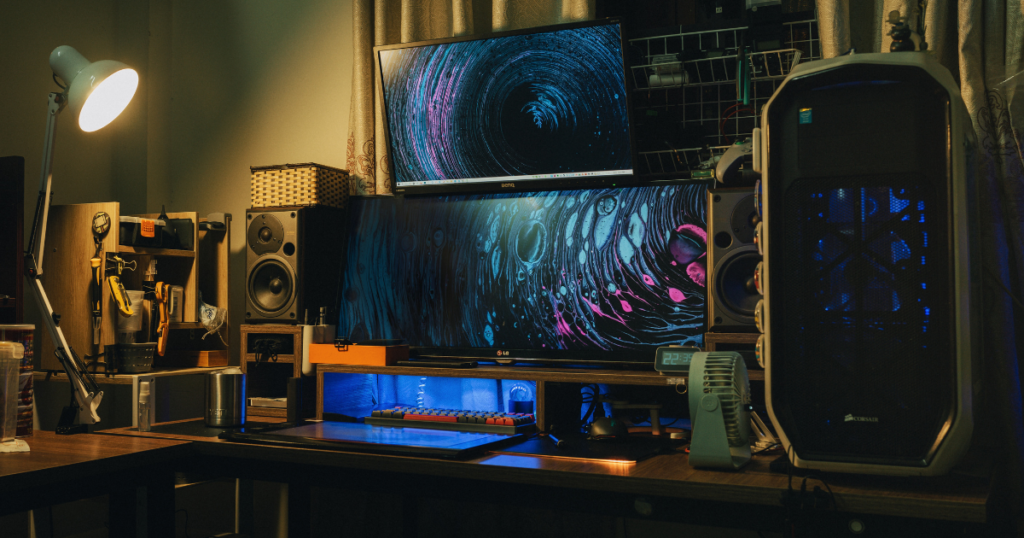Struggling to focus at work? You’re not alone. Many professionals find themselves battling distractions, juggling multiple tasks, and feeling overwhelmed by the constant stream of interruptions.
This lack of concentration can lead to decreased productivity, missed deadlines, and increased stress levels.
Did you know that multitasking can reduce productivity by up to 40%? It’s true. Our brains aren’t wired to handle multiple complex tasks simultaneously. This blog post will explore effective strategies to overcome work distractions, boost your focus, and increase your efficiency.
We’ll cover practical tips you can implement right away to create a distraction-free work environment. Ready to reclaim your focus and skyrocket your productivity?
Reasons You Can’t Focus at Work

Workplace distractions can derail your productivity and leave you frustrated. Understanding the root causes of your focus issues is crucial for finding effective solutions.
Fatigue and lack of rest
Fatigue and lack of rest can severely impact your ability to focus at work. Research from the University of Pennsylvania School of Medicine shows a direct link between sleep deprivation and impaired cognitive function.
This translates to decreased productivity, forgetfulness, and difficulty concentrating on tasks throughout the day.
Chronic sleep deprivation poses even more serious risks. A study in The Journal of Neuroscience found that continued lack of sleep can destroy brain cells – mice lost 25% of their locus ceruleus neurons after just three days of limited sleep.
For optimal cognitive performance, adults need seven to nine hours of quality rest each night. I’ve personally experienced the effects of sleep deprivation, struggling to complete simple tasks and make decisions after pulling an all-nighter.
Sleep is the single most effective thing we can do to reset our brain and body health each day. – Dr. Matthew Walker, Sleep Scientist
External distractions
While fatigue can significantly impact focus, external distractions pose another major challenge to workplace concentration. These interruptions come in various forms, both in traditional office settings and remote work environments.
In offices, coworkers often become a primary source of distraction through casual conversations, impromptu meetings, or even loud phone calls. Working from home presents its own set of disruptions, including household chores, family members, and personal tasks that vie for attention.
News consumption – whether positive or negative – can also derail productivity. Negative news may amplify personal worries, making them seem more severe and threatening. Conversely, exciting or positive news can trigger an adrenaline rush, ultimately decreasing work performance.
To combat these external distractions, creating a dedicated workspace, setting clear boundaries with colleagues or family members, and limiting news intake during work hours can help maintain focus and boost job efficiency.
Juggling multiple tasks
Multitasking at work often leads to decreased productivity and increased stress. Research shows that while people might feel they’re accomplishing more, they actually produce less and experience higher frustration levels when juggling multiple responsibilities.
I’ve personally found that trying to handle numerous tasks simultaneously results in more errors and prevents deep, focused work.
Implementing effective time management techniques can significantly improve focus and output. The Pomodoro Technique, which involves 25-minute work sprints followed by short breaks, has helped me tackle tasks more efficiently.
Another useful approach is the 52/17 method – 52 minutes of concentrated work followed by a 17-minute break. These strategies allow for better task prioritization and create a more productive work environment, minimizing the negative impacts of constant task-switching.
Medical conditions
Medical conditions can significantly impact workplace focus and productivity. Cognitive impairments, attention deficit disorders, and other neurological issues may interfere with an employee’s ability to concentrate on tasks.
These health challenges often manifest as difficulty maintaining attention, increased distractibility, or struggles with complex problem-solving. Neurodivergent individuals might require specific accommodations or tools to optimize their work performance.
Stress-related mental health disorders also play a crucial role in focus challenges at work. Anxiety, depression, and burnout can cloud thinking and decrease overall productivity. Recognizing these underlying medical factors is essential for addressing workplace focus issues effectively.
Employers and employees alike benefit from understanding how various health conditions affect cognitive function and implementing appropriate strategies to support affected workers.
Disliking your work
Disliking your work can significantly impact your ability to focus. Unpleasant tasks often lead to procrastination, boredom, and feelings of inadequacy. These negative emotions create a cycle of avoidance, making it increasingly difficult to stay motivated and productive.
Workers may find themselves struggling to concentrate on assignments they don’t enjoy, leading to decreased performance and job satisfaction.
Conquering dreaded tasks early in the day can boost focus and motivation. By tackling the most challenging or disliked responsibilities first, employees often experience a sense of accomplishment that carries through their workday.
This approach helps overcome the initial resistance and fear associated with unpleasant duties, paving the way for improved concentration on subsequent tasks. The next section explores practical tips for overcoming work distractions effectively.
Tips for Overcoming Work Distractions
Work distractions can derail your productivity and leave you feeling overwhelmed. Implementing effective strategies to combat these interruptions is crucial for maintaining focus and achieving your goals.
Get proper rest and plan healthy meals
Proper rest and meal planning form the cornerstone of a focused workday. Aim for seven to nine hours of sleep nightly to recharge your brain and body. This rest allows you to tackle tasks with renewed energy and sharpened concentration.
Pair restful nights with nutritious meals throughout the day. Opt for balanced, nourishing foods that fuel your body and mind. Hydration plays a crucial role too – keep water nearby to maintain mental clarity.
Establishing a consistent sleep schedule and meal routine creates a solid foundation for productivity. Plan your meals ahead of time, focusing on nutrient-rich options that provide sustained energy.
Include a mix of proteins, complex carbohydrates, and healthy fats in your diet. Regular exercise complements these habits, boosting both physical health and mental acuity. By prioritizing rest, nutrition, and activity, you’ll build a healthier work routine and enhance your ability to stay focused on tasks.
Reduce stress and seek medical help if needed
Proper rest and healthy meals lay the foundation for better focus, but managing stress is equally crucial. Stress can trigger brain fog and heighten anxiety, making concentration a challenge.
Identifying and addressing your specific stressors is key to improving cognitive function. This might involve practicing mindfulness techniques, engaging in regular exercise, or setting boundaries at work.
For persistent focus issues, don’t hesitate to consult a healthcare professional. Underlying medical conditions can impact concentration, and a doctor can provide tailored strategies or treatments.
From personal experience, I’ve found that combining stress-reduction techniques with professional guidance significantly enhanced my productivity and overall well-being at work. Remember, prioritizing your mental health is essential for professional development and long-term success.
Isolate distractions and collaborate with coworkers
Reducing stress and seeking medical help are crucial steps, but creating a distraction-free environment is equally important for maintaining focus. Isolating distractions in your workspace can significantly boost productivity.
Clear your desk of unnecessary items, organize digital files, and use noise-canceling headphones to minimize auditory interruptions. Establish “focus zones” where coworkers know not to disturb you during specific times.
Collaboration with colleagues plays a key role in managing distractions effectively. Set up communication boundaries by agreeing on specific times for meetings and discussions. Use team collaboration tools to streamline information sharing and reduce impromptu interruptions.
I’ve found that implementing a “do not disturb” signal, like a small flag on your desk, can be incredibly effective in maintaining uninterrupted work periods while still fostering a cooperative environment.
Take breaks and exercise
Shifting gears from isolating distractions, we move to an equally important aspect of maintaining focus: taking breaks and incorporating exercise. Regular breaks throughout the workday aren’t just a luxury—they’re essential for sustaining productivity and mental sharpness.
Stepping away from your desk at intervals allows your brain to recharge, reducing mental fatigue and improving concentration when you return to tasks.
Physical activity during these breaks amplifies the benefits. A quick walk, some stretches, or even a few minutes of desk exercises can boost blood flow, decrease stress levels, and enhance cognitive function.
The Pomodoro Technique—working in focused 25-minute blocks followed by short breaks—offers a structured approach to this practice. Implementing movement breaks not only refreshes your mind but also counteracts the negative effects of prolonged sitting, contributing to better overall health and increased work efficiency.
Schedule more challenging tasks first
Taking breaks and exercising can rejuvenate your mind, but tackling difficult tasks head-on is equally crucial. Prioritizing challenging assignments early in your workday capitalizes on your peak mental energy.
This approach, often called “eating the frog,” stems from Mark Twain’s advice: if you eat a live frog first thing in the morning, nothing worse will happen all day. By conquering your most daunting task first, you’ll boost productivity and maintain focus throughout the day.
Time management experts recommend this strategy to combat procrastination and enhance efficiency. Studies show that willpower diminishes as the day progresses, making it harder to concentrate on complex tasks later.
Implementing this technique requires setting realistic goals and breaking larger projects into manageable chunks. Personally, I’ve found that tackling my toughest assignments before lunch significantly reduces stress and improves my overall work performance.
How Microdosing Can Help You Stay Focused
Microdosing can boost focus and productivity at work. It offers a potential solution for those struggling with concentration and mental clarity.
Schedule35’s Microdoses
Schedule35’s Microdoses offer a promising solution for workers struggling with focus and productivity. These carefully calibrated small doses are designed to enhance concentration, improve attention, and minimize distractions in the workplace.
Users report increased mental clarity, heightened alertness, and boosted cognitive function – all crucial elements for tackling complex tasks and meeting deadlines.
By incorporating Schedule35’s Microdoses into their routine, employees may experience improved performance and enhanced focus throughout their workday. The microdosing approach aims to provide subtle yet effective benefits without interfering with normal work activities, potentially leading to increased productivity and better overall job satisfaction.
Conclusion
Distractions at work can derail productivity, but implementing effective strategies can help you regain focus. Creating distraction-free zones and practicing time blocking are powerful tools to enhance concentration.
Setting realistic goals and muting non-essential notifications reduce interruptions, allowing for improved task management. Taking regular breaks for breathing exercises or short walks sharpens mental clarity and boosts efficiency.
Remember that small, actionable changes often yield significant results in building and maintaining focus. Prioritize self-care through proper sleep, hydration, and nutrition to support a healthier work routine.
Start with one change at a time, and watch your productivity soar as you master the art of overcoming workplace distractions.
FAQs
1. What are common work distractions?
Common work distractions include:
– Social media notifications
– Chatty coworkers
– Noisy environments
– Constant emails
– Personal phone calls
– Unscheduled meetings
These interruptions break focus and reduce productivity.
2. How can I improve my focus at work?
To boost focus:
– Set clear goals
– Use time-blocking techniques
– Create a distraction-free workspace
– Take regular breaks
– Practice mindfulness
– Limit multitasking
These strategies help maintain concentration and increase efficiency.
3. Are there tools to help manage work distractions?
Yes, several tools can help:
– Website blockers
– Noise-canceling headphones
– Time-tracking apps
– Focus-enhancing music
– Pomodoro timers
– Task management software
These aids minimize interruptions and promote better work habits.
4. How do I handle unavoidable interruptions?
To manage unavoidable interruptions:
– Set boundaries with coworkers
– Use “do not disturb” signals
– Schedule specific times for emails and calls
– Practice quick refocusing techniques
– Keep a notepad for sudden thoughts
– Communicate your focus needs to others
These methods help maintain productivity despite disruptions.









